Charming scenery, familiar faces, and holiday parades mark the spot of Missouri downtowns. The sentimental value of Main Streets lure children who have left their hometown back for visits or to make their homes and it brings tourists in to enjoy bed and breakfasts.
Romanticizing smaller Main Streets is easy, but many downtowns have been diminishing across Missouri over the past decades. With online shopping, chain restaurants, and grocery stores, people can easily deviate from the strip that once was the heartbeat of the town, and COVID-19 has caused even more challenges for local business owners. Missouri Main Street Connection (MMSC) works to help preserve these areas and the history surrounding them.
In 1980, The National Main Street Center was created by the National Trust for Historic Preservation to address the issues surrounding older downtowns and help revitalize them. At this time, the Main Street Four-Point Approach was also created as a methodology for community revitalization. MMSC, which is primarily funded by private contributors, was created in 2005 and adopted the approach. The four points are organization, economic vitality, design, and promotion.
MMSC’s main goal is to help preserve historic downtowns by enhancing the economic, social, cultural, and environmental well-being of these areas. The organization helps guide these communities to learn what the town’s specific needs are and how to better their own communities from the inside out.
“We fully believe without a healthy downtown, the community is not healthy,” Gayla Roten, the state director at Missouri Main Street Connection says.
The MMSC team communicates with the local revitalization organizations in each town and the people spearheading the revitalization efforts. Gayla and her team have raised millions of dollars in funds from state, federal, and foundation grant programs to help local Main Street organizations.
The MMSC journey began with ten pilot programs. Today, MMSC works with 168 communities and follows the same Four-Point Approach that was created in the ’80s. Missouri Main Street communities report economic impact in their districts to MMSC each quarter. In 2019, $4.1 million was dedicated to public improvements, and there were 59 new businesses, 262 new jobs, and 42,158 volunteer hours.
Warrensburg
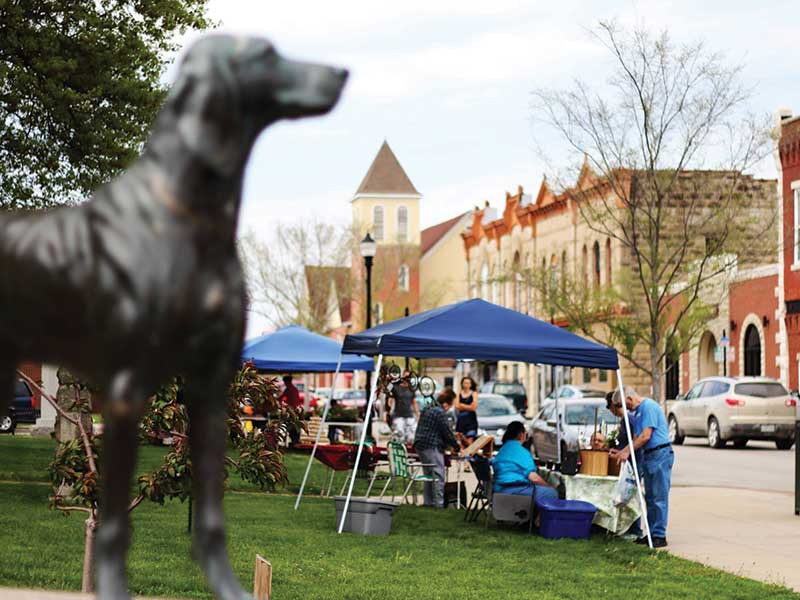
With just over 20,000 people, Warrensburg is one of the seven accredited communities at MMSC, meaning it has national and state accreditation, and they have met the highest standards set by MMSC.
“I always say with Main Street, the sky’s the limit,” Jill Purvis, the executive director at Warrensburg Main Street says. “There’s so much you can do with the staff, the resources, and the volunteers. So as organizations grow, they can financially add more staff and then they can get more things accomplished. It’s a cycle.”
In 2012, Jill started out as the event coordinator at Warrensburg Main Street and has seen the program grow. It receives funding through fundraisers, partnership contributions, event income, grants, and city funding. Even though Warrensburg is an accredited community, it still receives help from MMSC and Warrensburg as needed. Each year, the city and Main Street coordinates facade grants for businesses to use to maintain and update the facade of the buildings downtown, to accomplish one of the key points of the Four-Point Approach, which is design.
Between 2006 and 2019, there have been 330 total project approvals—private investments from businesses or building owners to improve their downtown business—48 net new businesses, and 29,350 volunteer hours dedicated to Warrensburg. Some of the staple businesses in Warrensburg’s downtown includes Ivory & Lace Bridal Boutique, Taqueria Habana, MKT Clothing Co., and Heroes Restaurant & Pub, which is one of the anchor businesses that has been in Warrensburg since 1981. The anchor businesses kept the downtown alive during the years while the newer businesses are helping to revamp the area.
Rachel Mifflin opened Ivory & Lace Bridal Boutique in 2014. The business moved to a larger downtown location in 2018. She is also the co-owner of MKT Clothing Co., which is two minutes away from the bridal store.

She works with Warrensburg Main Street to promote both businesses. Main Street hosted two meetings a week for downtown business owners to attend virtually during the early days of COVID-19. They discussed what businesses were closing, city ordinances, when everyone could apply for forgiveness, and such.
“I’m not going to lie, the bridal business is not the easiest business to try to sustain through COVID,” Rachel says. “We’re not going to close, but it definitely has been very stressful on all facets. Main Street has done really great in making sure we have signage if we need it about the mask order, and they’ve been doing a lot more social media since COVID started to share different specials and stuff that we’re doing.”
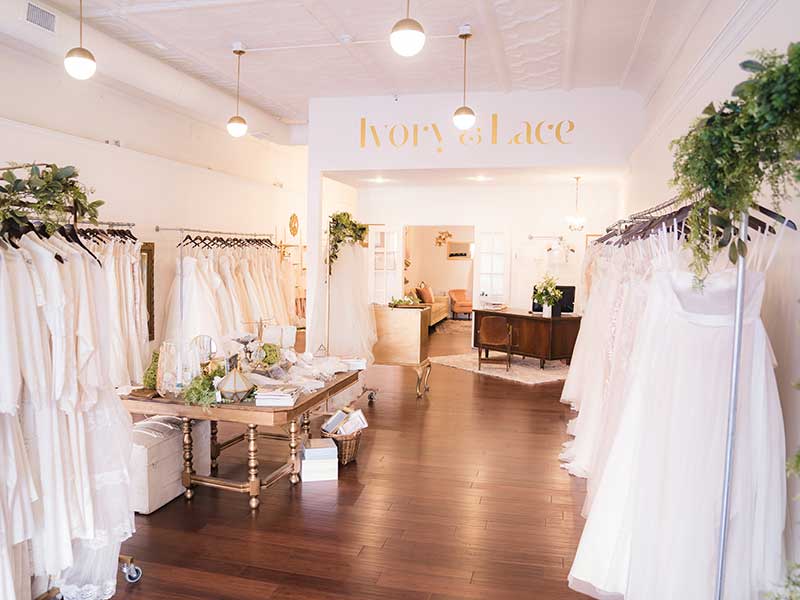
Warrensburg Main Street also alerted the downtown businesses when federal and state grants were available. Rachel says there has been an increase in support for MKT Clothing Co., which opened in October 2019.
“For the clothing boutique, the response during COVID has been great because people are wanting to shop local and they don’t want to go to the city,” Rachel says. “And [Warrensburg Main Street] has definitely been pushing more to support your local businesses.”
Clinton
Clinton, home of Missouri’s largest downtown square, was one of the first towns to enter the pilot program when it began. Two years ago, Main Street Clinton re-envisioned the program, and now Clinton is an associate community and has recently won the Best New Creative Event award for its Quilt Walk. Clinton has recently begun to renovate the outside of buildings downtown by replacing old awnings and updating signs. Businesses such as Big Deal Discounts Galore have been moving downtown, and in the past three years, roughly twenty-nine new businesses have opened on the square.
“For me, revitalizing our community is so important, because I remember how much I loved growing up here, and I can’t imagine a place where my daughter is not going to be able to enjoy those same things,” Tina Williams, executive director at Clinton Main Street, says. “I remember coming down on the square with my parents and going into the shops and picking out something unique, and then going to the restaurant where everyone knows everyone.”

“The accreditation we always strive for makes us a better Main Street Program because we want to get the blue ribbon at the end of the year,” Barry Glasscock, board president of Clinton Main Street, says. “They laid out a framework for how these organizations should function and it gives us something to follow so we know how to run the program the proper way.”
Clinton Main Street is privately funded and the staff and volunteers host fundraisers throughout the year, but because of COVID-19, they had to cancel Piccadilly, one of their largest fundraisers. They are now working to find new ways to generate funds.
“Meanwhile, we are focusing more on grants in hope that we will at least be able to provide benefit to the community without deeply affecting our budget,” Tina says.
With a growing downtown, a population of about 9,000, and a more lively community, people are remembering why downtown was the most popular place to be at one point in history. Sarah Goth owns The Bluebird Mercantile with her mother Tamie Smith. They opened the business on Clinton’s Main Street in 2018. The store specializes in Missouri-made products. Tamie is also on the Promotions Committee at Clinton Main Street.
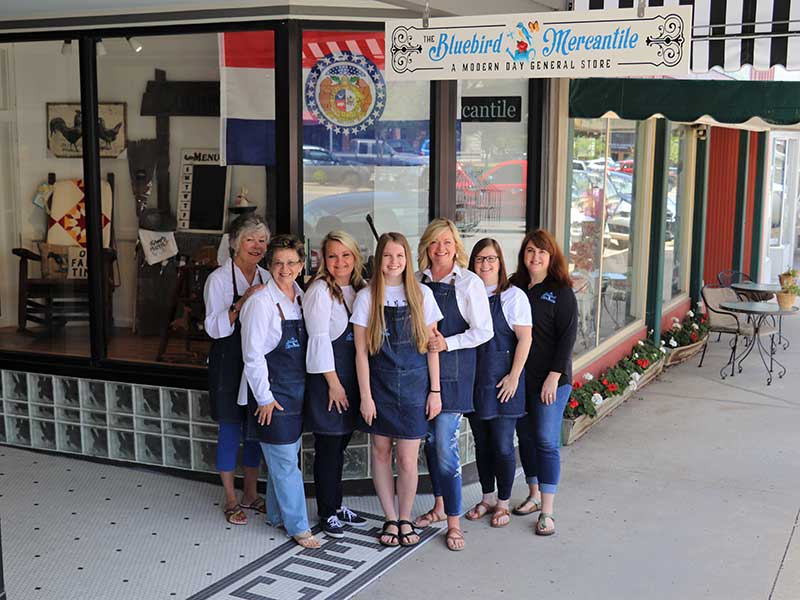
“I’m a local, born and raised here,” Sarah says. “So a lot of people had asked me originally why didn’t you put your business out on the highway where business is busier. My response and my thought was, ‘If a local person is not going to invest in the downtown, who is?’ ”
When her business had to temporarily close because of COVID-19, she saw the local businesses rallying together even more than usual. She was able to still make online sales and work alone in her store, as did other business owners who continually checked up on one another.
“It kind of feels like a family right now more than anything else,” Sarah says. “Everybody is checking on each other and seeing if anyone needs anything and especially when we were closed.”
Once she was able to open her doors again, the community had the same response.
“People have come in specifically to buy gift certificates to use at a later time and have said ‘We’re doing this just to keep money flowing through your register and we’ll spend it at a later time,’ ” Sarah says.
“One of the things that makes us so successful as a Main Street and makes our downtown and the whole city of Clinton so successful is our people,” Tina says. “We are incredibly glad we have shop owners who care about what their buildings look like, and care about if their neighboring shops are doing OK. That culture of caring is really amazing here in Clinton.”
NIXA
Nixa is an affiliate community that was awarded the Community Empowerment Grant. The grant provides hands-on help to the community and funds the state association guiding them through the Four-Point Approach and how to follow the Main Street philosophy.
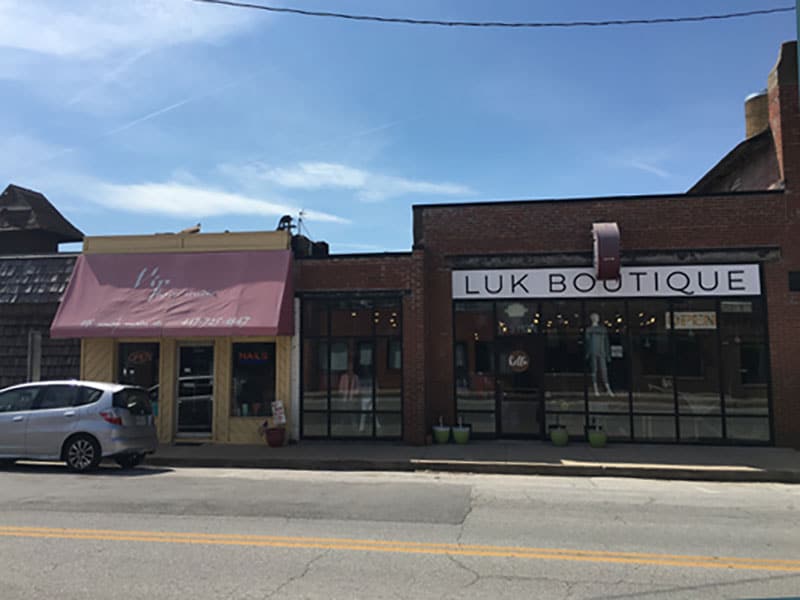
More than 21,000 people reside in Nixa, and the town is fairly new to the program. The Downtown Nixa Revitalization Committee has successfully set up the facade grant with the city as a first step. The committee has set a clear boundary for where their downtown is so they know where to focus their efforts. In July, they created a survey for community members to share their thoughts and opinions on downtown, and the committee holds monthly meetings for business owners and community members. Recently, they have also begun to expand downtown parking.
“We are actively pursuing a lot of avenues to help with this process including a great relationship with the City of Nixa, Nixa Chamber of Commerce, MMSC, and the local business owners,” Eric Albers, a board member of the Downtown Nixa Revitalization Committee says.
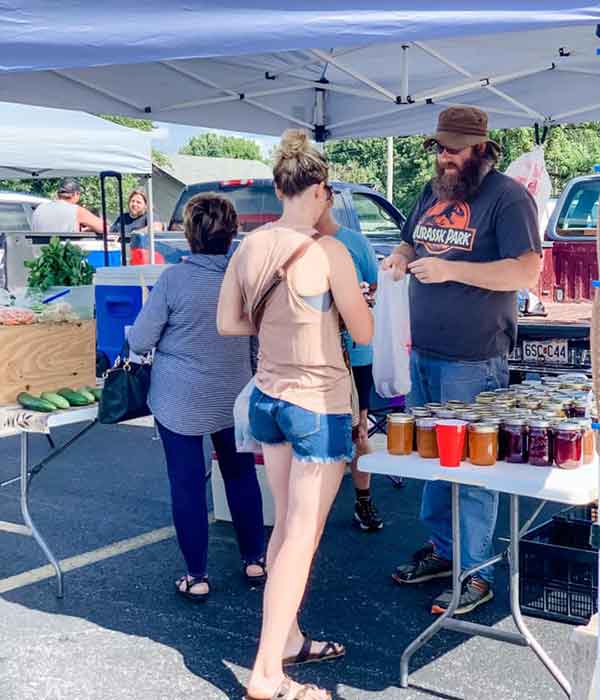
LUK Boutique is one of the downtown businesses. The store originally opened in 2015 as Little Uptown Kids and rebranded in 2018 and became a women’s clothing store. Luckily for owner Stephanie Kubla, she was able to continue business during the shut down.
“When we were forced to close our shop, our customers showed the most support ever,” Stephanie says. “We offered free shipping online and back porch pick up, which a lot of our customers utilized.”

She has played a small role in the committee due to her busy schedule with three children, but during COVID-19, she found her own way to help Nixa’s downtown community. LUK created a T-shirt with the hashtag #nixastrong. With every purchase, $10 was donated to a local business of the buyers choice.
“We were able to not only keep our sales the same volume as being open, but we were able to donate about $3,000 to other local businesses that month,” Stephanie says.
FESTUS
Festus has around 12,000 residents and is an affiliate community. Some restaurants that have stayed on Main Street through the years are Pogolino’s Pizza, Petit Paree Restaurant & Lounge, and the 1950s-style diner Gordon’s Stoplight Drive In. Although the diner is on the other side of Main Street, which becomes Crystal City, it is still considered a staple in both towns that are known as The Twin Cities. Festus and Crystal City share a Main Street. The Historic Tanglefoot Association in Festus is working to enliven both.

Denny Foster, president of the Historic Tanglefoot Association and co-owner of Main & Mill Brewing Company on Festus Main Street, has his hands in a little bit of everything. The association got its name from Festus’s old name from 1878, Tanglefoot. Legend has it Tanglefoot got its name because Crystal City, named New Detroit at the time, was a dry town. Men would get off work and head to the other side of Main Street for a drink. After leaving the bars, men would get their feet tangled up on the way back home.
In 2015, Denny and his father Barry Foster opened the doors of Main & Mill for the first time, which seemingly sparked the revitalization of the town’s Main Street. Since then, a handful of other businesses have opened, including the Brick Bistro and Brew, Queen Anne’s Lace, Strings, The Corner Cup Micro-Bakery, and Peace of Mind.
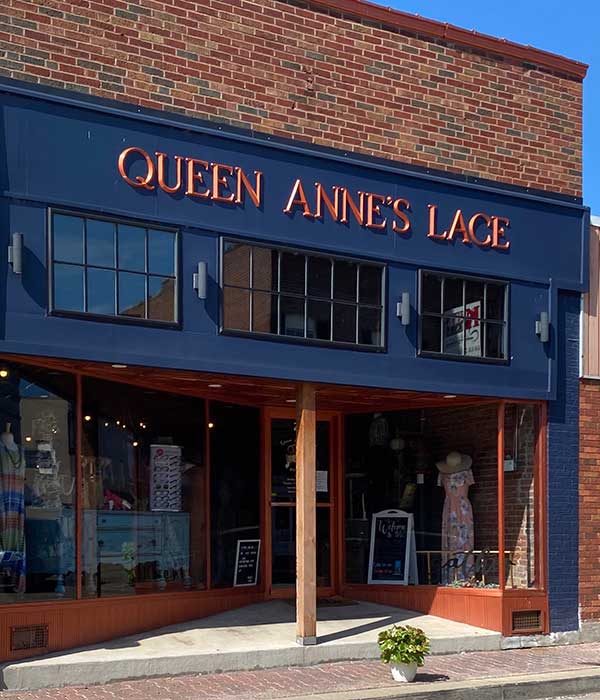
Denny decided to revive The Historic Tanglefoot Association, which had stopped operating. He invited other business owners and community members to discuss the future of Main Street and how they could better it for the community.
“It needed a jumping off point,” Denny says. “There had to be somebody that would put a lot of time, effort, and money into something on Main Street to show that the value is there. I’ve always had a passion for wanting to see our Main Street thrive even as a kid,” Denny says. “Living here and knowing this community really well, I thought that if we spent a lot of time and effort revitalizing and building, the community would embrace it, the business owners and people who had a dream of opening a business would embrace it, and so far it’s worked.”
The association began to work with MMSC and implemented the Four-Point Approach.
“We are able to utilize their resources,” Denny says. “They’re helping us get better as an association and accomplish more things like fundraising, but it also gives us a connection with other communities to see what they did and what was successful and what maybe wasn’t so successful.”
StreetFest is held annually to celebrate the anniversary of Main & Mill. Live music, food, and special beer releases are available all day, and each year the event has grown with hundreds of people traveling to Main Street. The Taste of Tanglefoot, Bikers on Main, and a Spring Fling are other draws to downtown.
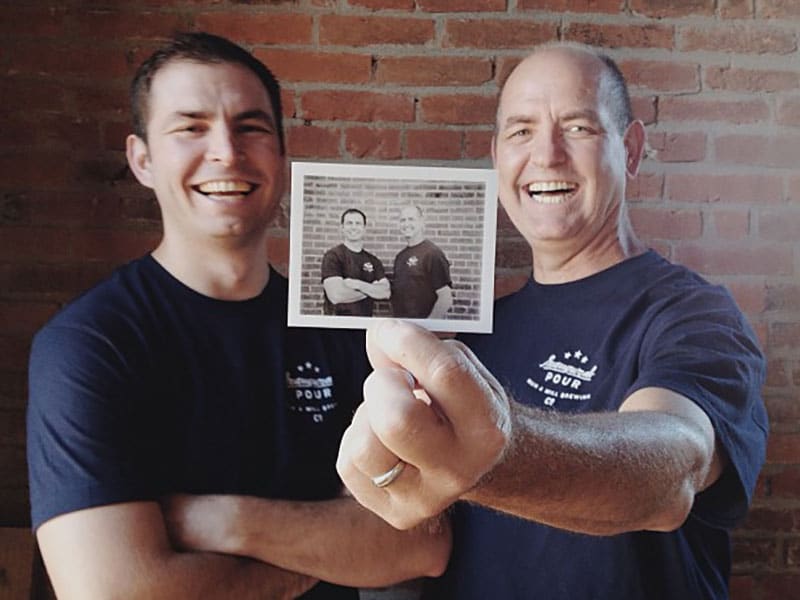
Like with most places, COVID-19 has put a pause on some of the planning and made owning small businesses even more difficult, but that isn’t stopping the Historic Tanglefoot Association from looking forward and rallying together as a community to help their neighbors.
“We’ve had a lot of people volunteering, donating meals to people in need, people stepping forward and saying ‘Hey, if anyone needs anything, we’ll do whatever we can to help,’ ” Denny says. “The businesses that are going to survive during this time are going to come out stronger than ever, and I think it’s going to be a benefit in general overall. It’s been very, very difficult so if people can survive through this as a business, there’s very few things that they’ll not be confident that they’ll work their way through.”
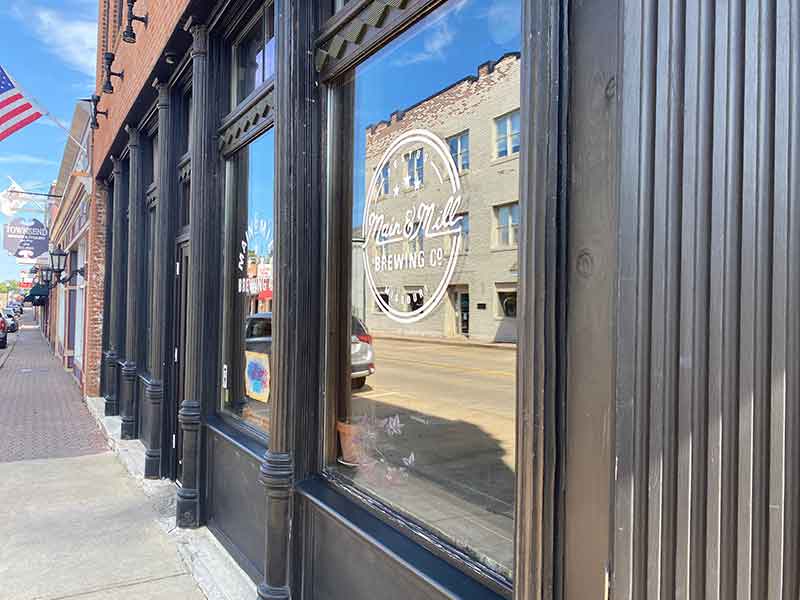
“We are keeping those businesses alive in our town rather than going straight online. If our downtown community goes, our whole community is going to suffer.” –Gayla Roten, the State Director at MMSC
How to Support Local Businesses in Your Town
When a festival or fundraiser is coming up, reach out to your Main Street committee and offer your time. If you don’t have a committee, contact local business owners to see if they need extra help during the event.
- Spend money at your local businesses.
- Like, follow, and share their social media pages, posts, and photos.
- Leave a good review.
- Spread the word about the business.
7 Accredited Towns
MMSC separates communities into a tier system. Towns begin as aspiring communities, then progress to affiliate communities, then associate communities, and finally become an accredited Main Street. Currently, there are seven accredited communities in Missouri: Chillicothe, Excelsior Springs, Liberty, Lee’s Summit, Warrensburg, Washington, and Cape Girardeau.
Photos // Mike Curtis Photography, Joshua Williams, ReelTime Photography, Bluebird Mercantile, Stephanie Kubla, Luk Boutique
Related Posts
My Missouri Life
Missouri Life magazine's new editor-in-chief, Sandy Selby, greets readers through the My Missouri Life column.
I popped up from my nest of pillows and books in the back of the family station wagon and announced, “I’m going to live in Missouri when I grow up.” I made that declaration at age nine as my family traveled from our home in northeastern Oklahoma to Branson for a vacation.
This is Our Missouri
A photo project helps commemorate the bicentennial.



